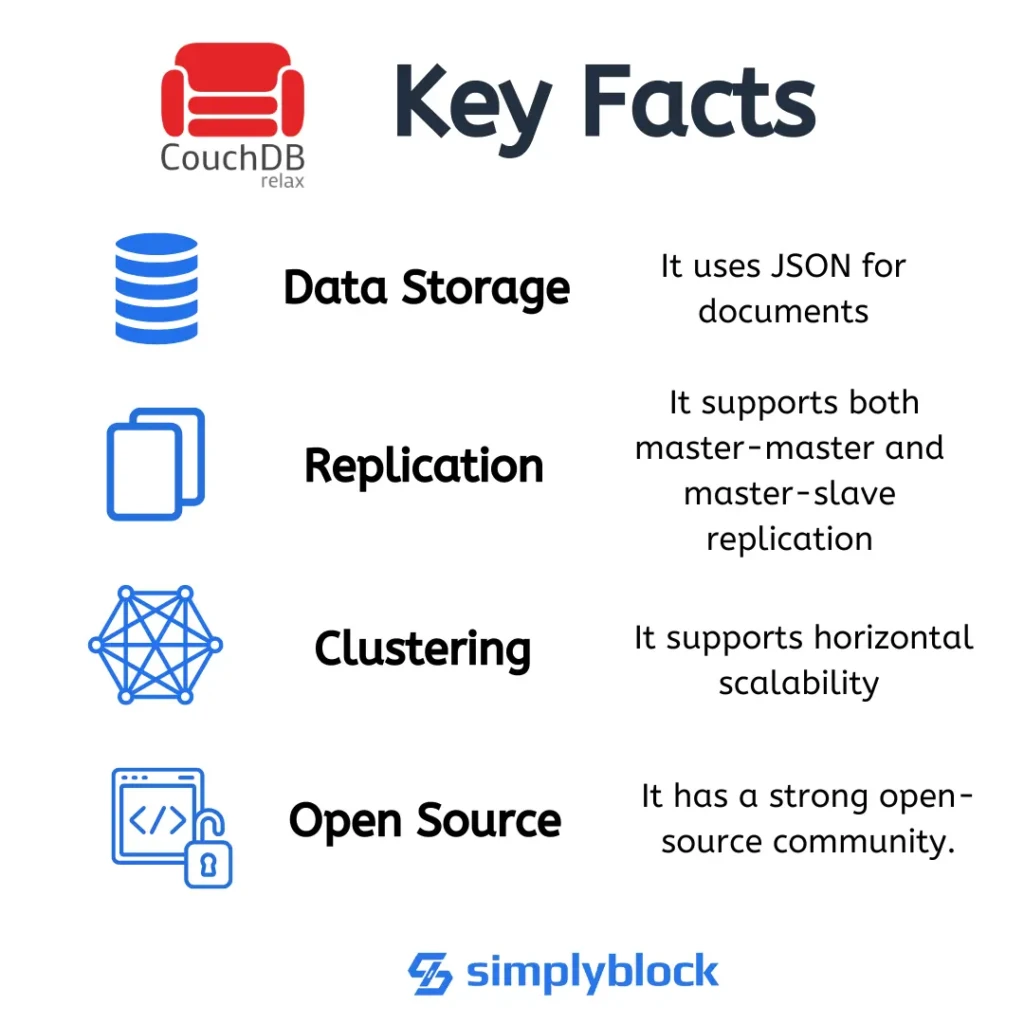CouchDB
Terms related to simplyblock
What is CouchDB?
CouchDB is an open-source NoSQL document database developed by the Apache Software Foundation. It is designed for availability, horizontal scalability, and fault tolerance. Unlike traditional relational databases, CouchDB uses a schema-free JSON document model, making it ideal for handling semi-structured or dynamic data.
Built with Erlang, CouchDB supports master-master replication, ensuring high availability across distributed environments. Each node in a CouchDB cluster can independently accept writes, with eventual consistency achieved through conflict resolution logic.
CouchDB is a core building block for edge or offline-first applications. It integrates well with mobile and web applications due to its HTTP/REST interface and sync features via PouchDB, its JavaScript companion library.
CouchDB Architecture
CouchDB stores data as JSON documents. Each document includes metadata and is identified by a unique _id field. The system tracks document revisions via MVCC (Multi-Version Concurrency Control), ensuring that updates and replication can occur without locking the database.
Its core components include:
- Storage Engine: B-tree indexes for fast lookups.
- MapReduce Views: Used to query documents efficiently.
- Changes Feed: Enables applications to monitor database updates in real-time.
Replication and Synchronization
Replication is one of CouchDB’s distinguishing features. It supports one-way and bidirectional replication between nodes or clusters. This feature is particularly useful in distributed and edge environments where intermittent connectivity or offline functionality is required.
For real-world deployment, this feature is comparable to simplyblock™’s distributed architecture, which also prioritizes fault tolerance and data redundancy.

CouchDB vs Relational Databases
Before diving into a comparison table, it’s important to note that CouchDB uses JSON documents instead of rigid schemas. This gives it flexibility, but also means trade-offs in areas like strong consistency and complex queries.
Comparison Table
Here’s how CouchDB stacks up against traditional relational databases:
| Feature | CouchDB | Relational Database (e.g., PostgreSQL) |
|---|---|---|
| Data Model | JSON Documents | Tables with fixed schemas |
| Query Language | MapReduce, Mango Query | SQL |
| Schema Flexibility | Schema-less | Schema-bound |
| Consistency Model | Eventual Consistency | Strong Consistency |
| Replication | Master-Master | Typically Master-Slave |
| Use Case | Distributed, offline-first | Centralized transactional systems |
Use Cases for CouchDB
CouchDB is optimized for applications that require offline data access, synchronization, and distributed updates. Some common use cases include:
- Edge computing environments with spotty connectivity.
- Mobile applications requiring local storage and sync.
- IoT platforms that collect data from many distributed sensors.
- Content delivery systems that benefit from conflict-free replication.
These attributes align well with hybrid storage environments managed by simplyblock, where distributed performance and availability are key.
CouchDB and Kubernetes Storage Compatibility
Although CouchDB is typically used with its built-in file-based storage system, enterprises deploying CouchDB in Kubernetes environments should consider modern storage backends. Leveraging NVMe over TCP or software-defined storage solutions like simplyblock ensures that CouchDB maintains low-latency I/O and persistent data availability across pods and clusters.
Simplyblock’s CSI driver allows CouchDB pods to benefit from dynamic volume provisioning, QoS, and resilient failover in Kubernetes-native environments.
Integrating CouchDB into a Distributed Storage Architecture
For organizations requiring robust scalability and data durability, integrating CouchDB with a distributed backend like simplyblock’s NVMe-tuned infrastructure is a logical step. With its support for erasure coding and multi-tenancy, simplyblock complements CouchDB’s replication model by enhancing storage efficiency, reducing data redundancy overhead, and enabling secure tenant isolation.
Questions and Answers
CouchDB is a NoSQL database designed for ease of use, scalability, and data replication across distributed systems. It stores data in JSON format and is ideal for applications needing offline sync or high availability. Its MVCC model makes it perfect for conflict resolution in edge computing and mobile apps.
Yes, CouchDB is production-ready and widely used in real-time applications. It supports master-master replication, strong conflict handling, and horizontal scaling, making it a solid choice for fault-tolerant architectures. Its RESTful HTTP API also simplifies integration with modern cloud-native environments like Kubernetes.
While both are NoSQL databases, CouchDB emphasizes replication and offline-first use cases, using MVCC and JSON documents. MongoDB offers richer querying and indexing. If your application relies on multi-device sync and eventual consistency, CouchDB may be the better fit. For analytics or complex queries, consider MongoDB.
Yes, CouchDB supports clustering, enabling horizontal scaling and data redundancy across nodes. With multi-node replication, it ensures high availability and fault tolerance. It’s ideal for distributed workloads and environments requiring seamless failover.
CouchDB can run effectively on Kubernetes by leveraging StatefulSets for persistent storage and services for routing. For better performance, pairing it with NVMe over TCP storage can reduce latency in I/O-intensive workloads, especially in cloud-native environments.
